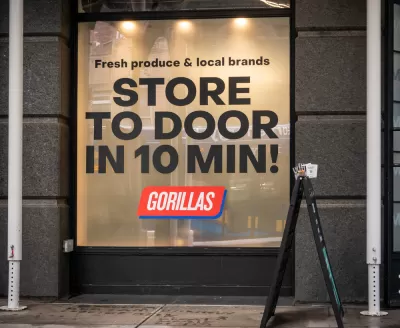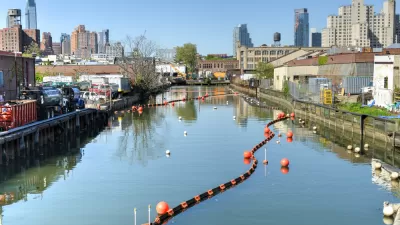After the city instituted a ban on cashless businesses, calling the model discriminatory against poor New Yorkers who rely on cash transactions, a study found that more than 80 percent of new fast-delivery stores don’t accept cash.

A new style of fast-delivery grocery stores is causing concern among New York City lawmakers, who in 2020 banned cashless businesses, saying they “discriminated against low-income consumers, who are less likely to have a credit card or bank account.” Yet a survey from Councilmember Gale Brewer’s office shows that 83 percent of fast-delivery operations do not accept cash payment, reports Arun Venugopal in Gothamist.
Although the Department of Consumer and Worker Protection says they “actively enforce” the policy, “Brewer said the city is failing to regulate this growing industry, one that is backed by venture capital and has been hyped in national media as the future of post-pandemic commerce. She complains the businesses, sometimes referred to as “dark stores,” flout other city laws, such as pricing-display rules, governing the commercial sector.”
According to Venugopal, “The city's ban against cashless businesses excludes purchases made online, by phone or by mail. But Brewer’s office notes that some locations do business both ways – taking remote orders and conducting in-person transactions – and need to follow the law barring cashless businesses as well as other city ordinances.”
Other councilmembers expressed concerns about data privacy and the threat these businesses pose to small, mom-and-pop stores in the city. “Councilmember Christopher Marte, whose father operated a bodega, is raising other concerns. He says the pandemic has caused numerous storefront vacancies in Chinatown and the Lower East Side, and worries that the small shops cannot stand up to the new fulfillment stores.”
FULL STORY: New wave of fast-delivery stores spark worries they threaten bodegas, isolate poor New Yorkers

Maui's Vacation Rental Debate Turns Ugly
Verbal attacks, misinformation campaigns and fistfights plague a high-stakes debate to convert thousands of vacation rentals into long-term housing.

Planetizen Federal Action Tracker
A weekly monitor of how Trump’s orders and actions are impacting planners and planning in America.

San Francisco Suspends Traffic Calming Amidst Record Deaths
Citing “a challenging fiscal landscape,” the city will cease the program on the heels of 42 traffic deaths, including 24 pedestrians.

Defunct Pittsburgh Power Plant to Become Residential Tower
A decommissioned steam heat plant will be redeveloped into almost 100 affordable housing units.

Trump Prompts Restructuring of Transportation Research Board in “Unprecedented Overreach”
The TRB has eliminated more than half of its committees including those focused on climate, equity, and cities.

Amtrak Rolls Out New Orleans to Alabama “Mardi Gras” Train
The new service will operate morning and evening departures between Mobile and New Orleans.
Urban Design for Planners 1: Software Tools
This six-course series explores essential urban design concepts using open source software and equips planners with the tools they need to participate fully in the urban design process.
Planning for Universal Design
Learn the tools for implementing Universal Design in planning regulations.
Heyer Gruel & Associates PA
JM Goldson LLC
Custer County Colorado
City of Camden Redevelopment Agency
City of Astoria
Transportation Research & Education Center (TREC) at Portland State University
Jefferson Parish Government
Camden Redevelopment Agency
City of Claremont





























